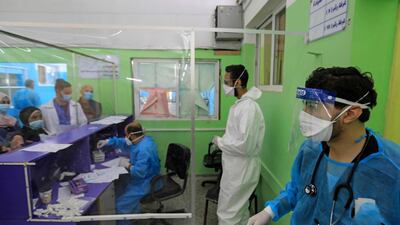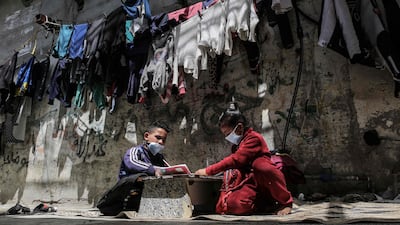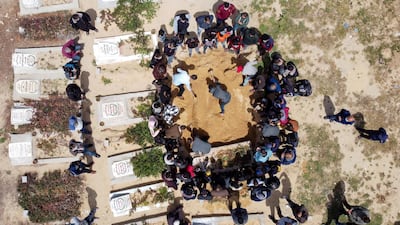Um Fayez Al Dremely will be breaking her Ramadan fast without her children this year as residents in the Palestinian enclave confront a surge in coronavirus cases.
“I am afraid of the coronavirus and also worry about my sons and daughters and their children, so I will take my iftar alone at home,” she said, referring to the evening meal during the holy month.
Mrs Al Dremely has 11 children, most of whom are jobless. Gaza’s unemployment rate has hit nearly 50 per cent, according to figures last June from the Palestinian Central Bureau of Statistics.
“Each year we gather on the first day of Ramadan. This is our usual habit, but this year the bad economic situation and coronavirus will stop us,” added the 48-year-old.
Active coronavirus cases more than tripled during March, the United Nations’ humanitarian affairs agency said.
More than 37 per cent of the latest tests carried out were positive, Health Ministry data published on Monday show, while nearly 700 people have died from the virus among a population of around 2 million.
Gaza’s Interior Ministry has imposed measures to slow the spread of Covid-19, including a 9pm curfew, a driving ban at weekends and the closure of weekly markets.
The latest round of restrictions and earlier measures during the pandemic have pushed more Gazans into poverty, including Mrs Al Dremely who relies on food donations.
“We’ve noticed this year an increasing number of families who need to be helped with food packages,” said Mohammed Abu Hassira, a volunteer with the Waslat Khair youth group.
“We succeeded in making around 50 food packages to give to people in need, but unfortunately we have a list with 400 to 500 families,” he added.
Ramadan around the Middle East – in pictures
The economic hardship means many residents are foregoing their pre-Ramadan shopping spree, doing without new decorations or ingredients for large meals.
Hamada Taha, a shopkeeper in the daily Al Zawiya market, said customers are more hesitant than they were a year ago.
“Ramadan season this year is not like it was before, with coronavirus and irregular employee salaries, the sales are not good,” the 29-year-old said.
With people shopping closer to home rather than travelling to the historic Al Zawiya market, or buying less than usual, Mr Taha estimates his sales have plummeted by 80 per cent compared to last Ramadan.
“Instead of buying one kilo of dates, they buy half a kilo,” he said.
Um Ali Al Zahar, 42, admitted her family will go without new lights during the holy month.
“I know that my children will be sad about not having Ramadan decorations this year, but I can do nothing about it,” she said in the market.
“We can’t throw our money away,” added Mrs Al Zahar, as her husband’s income only covers the essentials.
Instead, she will be careful to keep a distance while visiting family and celebrating iftar together.
“How can we feel (the start of) Ramadan if we don’t gather at the same table on the first day?” she asked.














